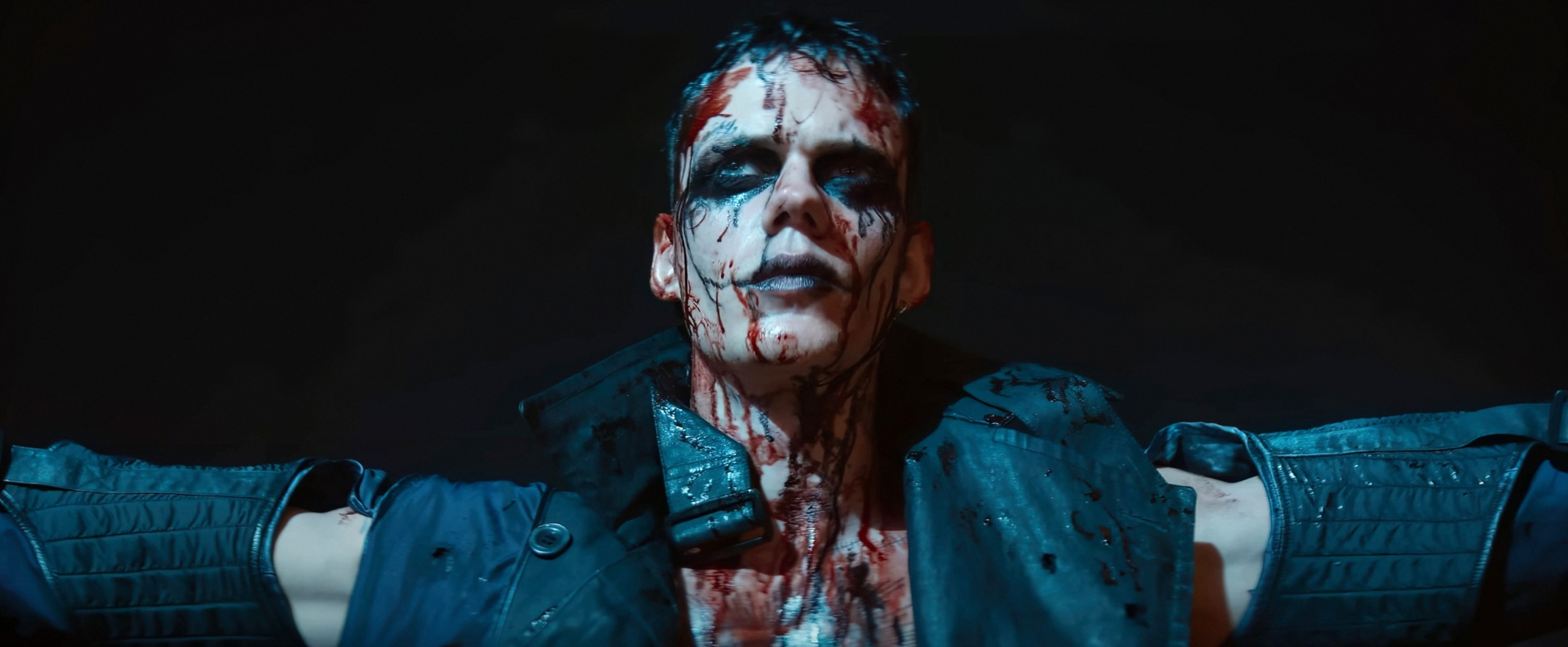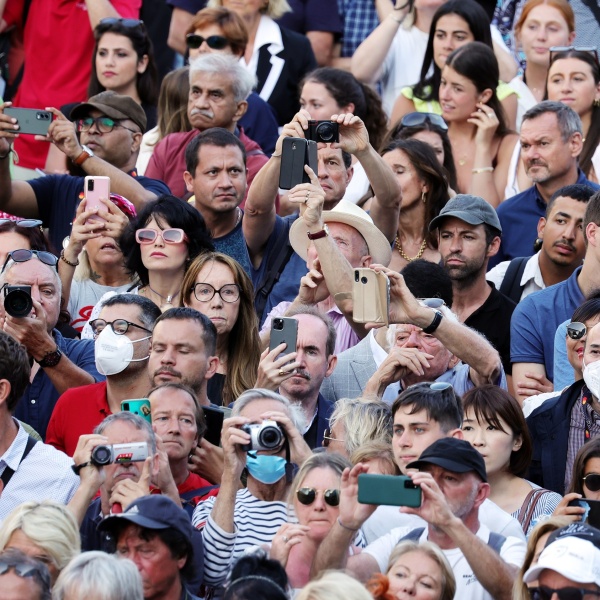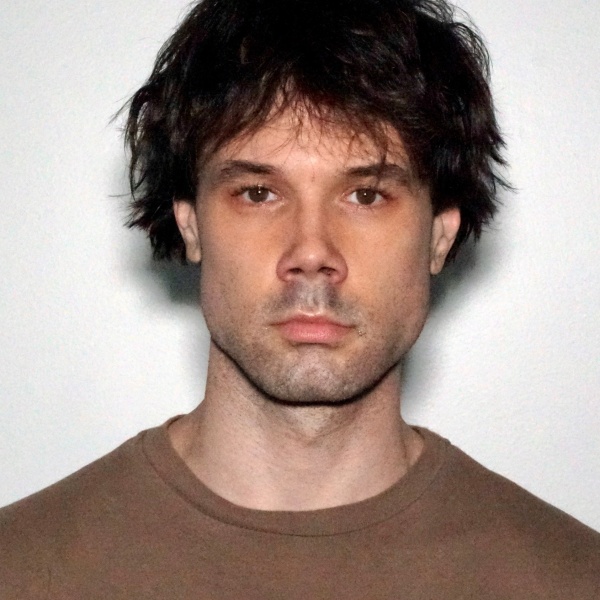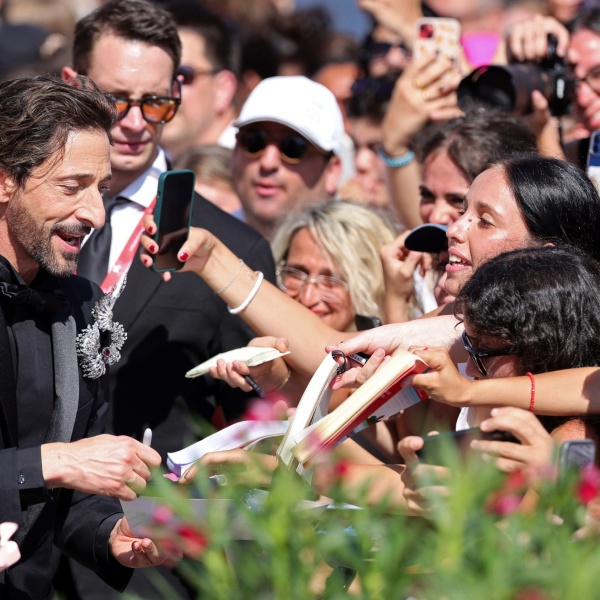Bill Skarsgård is an inked-up, goth angel of death in Rupert Sanders’ dreary new spin on “The Crow,” here an adaptation of James O’Barr’s supernatural graphic novel series rather than a retread of Alex Proyas’ controversial 1994 cult favorite. (That Proyas’ version remains a film maudit is an understatement, as star Brandon Lee was killed by a prop gun during a production completed in his honor with special effects and a stunt double.)
Written by Zach Baylin and William Schneider, this version of “The Crow” wisely banned real guns from the set, even though it’s filled with plenty of stylized ballistic killings and led by an undead Eric Draven (Skarsgård, in the Lee role) avenging the brutal death of his girlfriend (FKA Twigs, real name Tahliah Barnett). Despite moody, doomy set design and Skarsgård’s ominous silhouette as a very tall and beautiful walking corpse, Sanders’ “The Crow” is less giving with plot, hampered by an unfleshed and often confusing mythology that leaves the unsettling particulars of O’Barr’s source material for dead.
Setting up Eric as a traumatized Freudian headcase haunted by a hardscrabble childhood somewhere in Michigan, “The Crow” opens gruesomely on a dying horse impaled by barbed wire, a young Eric (Solo Uniacke) unable to save the animal or a deadbeat mother at home. That’s about as deep an exploration into his past as this movie goes, flashing forward to his adulthood, where unspecified demon-driven addiction lands him in a rehab center. Also there is Shelly (the musician and avant-garde artist FKA Twigs), on the run from a vaguely set-up fleet of elite criminals led by Vincent Roeg (Danny Huston, capable of elevating even the most undercooked material with his suave presence). She’s haunted by an iPhone video whose contents implicate her in a murder — and which are revealed in more graphic detail much later, but “The Crow” is almost whiplash-inducing in how quickly it throws us into the action with little information.
That this rehab penitentiary lets all genders mingle in the open is an odd contrivance to get us to Eric, whose cell is papered with disturbing ink drawings related to his past, meeting the diffident Shelly, a former musician. When Vincent and his minions show up at the facility, Eric helps Shelly escape with just a bit too much ease (why didn’t they think to cut off their ankle bracelets and hop out a laundry room window sooner?), and they hole up in a mauve-dappled apartment owned by Shelly’s friend, who’s in Antigua.
They take drugs, fuck, and read tortured poet Rimbaud in the most on-the-nose gothic literary reference in material steeped in them. Elsewhere, Shelly’s friend Zadie (Isabella Wei) is murdered by Vincent, whose telepathic evil power involves whispering something awful into a victim’s ear, tapping into the darkest parts of their soul, and compelling them to kill themselves. An intriguing murderous modus operandi that should be more horrifying than it is as the bodies of hollow characters pile up.

News of her friend’s death catches up to Shelly, and so does Vincent, and both she and Eric are killed in a brutal suffocation scene — until Eric is dropped into some untethered in-between, a steampunk limbo with a spirit guide (Sami Bouajila) full of foggy platitudes about life, death, and what comes after. Eric is resurrected back in the mortal world and given the chance to right things, with instructions to kill all who ended Shelley and her friends. The dark heart of “The Crow” lies in this doom-fated romance between Eric and Shelly, with Skarsgård and FKA Twigs sharing a sensuous physical chemistry even as their characters are largely underwritten. What are their cultural interests? Goals? Who were these people before we met them? Sanders gives FKA Twigs a musical moment that reminds of the groundbreaking artist’s real gift, which is behind a microphone and a piano.
The mystical hokum and dank, soggy Detroit atmosphere of the movie (Steve Annis handles cinematography) combine for an experience that feels just a bit mid-aughts emo, with Baylin and Schneider’s screenplay doing little to yank this story (first published in 1989) into a contemporary context. A gory sequence set to “Ropert le diable” as Eric descends upon an opera house is impressively staged, with realistic bullet wounds that ooze blood and smoke as Skarsgård empties yet another gun into an evil lackey.
Eric’s invincibility and newfound power to escape death — he feels all the pain, though, as bullet wounds knock the wind out of him or a car chase sequence leaves bones sticking out of his body — limit the suspense as Skarsgård tears through set pieces. Why doesn’t anyone think about just decapitating this guy? Could he regenerate his head as easily as his wounds, too? That I’d like to see.

“The Crow’s” thinly sketched arc leads to the inevitable philosophizing showdown between Eric and the film’s arch-nemesis, Vincent. Huston is an affable portrait of evil, his ability to cock an eyebrow or throw his voice into a subterranean bellow a special effect of its own. But the mythology of the nefarious society that’s after Eric and Shelly — her mother has something to do with it, though who knows what — is seriously lacking. We don’t know what these evildoers want exactly or what they were doing with Shelly in the first place. (There’s a hint at some upper-crust society human trafficking, here.)
Skarsgård’s performance, more compelling in the actor’s fighterly physical carriage than in the dramas that have shaped him into the sort of person who would wear a black trenchcoat and lather himself in dark eye makeup a la a twinkier Robert Smith, is an intriguing tease of the Count Orlok he’ll be playing in Robert Eggers’ upcoming “Nosferatu.” Here, the actor is often shirtless, gobsmackingly muscled, mulleted, top-to-toe tattooed, and it’s sexy, even if his character is a walking void, a color-killed soul often just deadly onscreen in failing to make us care to be along for the ride. “The Crow” is not a waste of talent or resources; worse, it just hangs there on the screen, as undead as Eric himself.
Grade: C
“The Crow” opens in theaters from Lionsgate on Friday, August 23.






